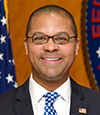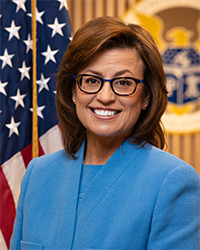Here's Your New FCC
Tuesday, October 10, 2023
Digital Beat
Here's Your New FCC
On September 30, the U.S. Senate unanimously voted to confirm Geoffrey Starks and Brendan Carr to serve another term as commissioners on the Federal Communications Commission. Just days before, the Senate confirmed Anna Gomez as FCC commissioner, filling a seat that had been vacant since January 20, 2021. Not only does the FCC now have a full complement of five commissioners, all have terms that will keep them at the agency until at least December 2025. So, the FCC is entering a period of relative stability in its leadership that has not been seen in a few years. Here's a quick look at this new FCC and the broadband priorities of the commissioners.
Chairwoman Jessica Rosenworcel

In December 2021, the Senate confirmed Jessica Rosenworcel as the first woman to lead the FCC. Her term runs through June 2025; she must exit if not reconfirmed by December 2026.
"People across the country count on the FCC to support the connections they need for work, learning, healthcare, and access to the information we require to make decisions about our lives, our communities, and our country," she said at the time, adding that she would work on making "the promise of modern communications a reality for everyone, everywhere."
Rosenworcel's agenda has been stymied by the lack of a majority over the past two years. She has teed up a number of items for full commission votes only to see them linger without decisions:
- In July 2023, she asked her fellow commissioners to vote on a proposal to create a pilot program to enhance cybersecurity protections for school networks.
- In June 2023, Chairwoman Rosenworcel proposed allowing E-Rate funding to support Wi-Fi on school buses, and to support Wi-Fi hotspots so that libraries, school libraries, and schools can check them out to patrons or students in need.
- Also in June 2023, the Chair asked the commissioners to support a formal Notice of Inquiry to learn more about how broadband providers use data caps on consumer plans.
- In July 2022, Chairwoman Rosenworcel tried to launch a Congressionally-mandated proceeding to evaluate the state of broadband across the country and proposed raising the national broadband standard to 100 megabits per second for download and 20 megabits per second for upload.
All these items await a vote from the full FCC.
On September 26, Chairwoman Rosenworcel shared with her colleagues a proposal to reaffirm rules that would treat broadband internet service as an essential service for American life. The proposed rules—under Title II of the Communications Act—would return fixed and mobile broadband service to its status as an essential “telecommunications” service and would allow the FCC to:
- Establish basic rules for broadband service providers that prevent them from blocking legal content, throttling speeds, and creating fast lanes that favor those who can pay for access;
- Reclassify broadband internet access to give the FCC and its national security partners the tools needed to defend our networks from potential security threats;
- Enhance the resiliency of broadband networks and bolster efforts to require providers to notify the FCC and consumers of internet outages; and
- Establish a uniform national standard rather than a patchwork of state-by-state approaches, benefiting consumers and broadband service providers.
The FCC is expected to launch this proceeding at its October 19 open meeting.
Commissioner Brendan Carr
Brendan Carr is the senior Republican on the Federal Communications Commission, and he served previously as the agency’s General Counsel. Nominated by President Donald Trump, Carr started as a commissioner in August 2017 saying, "Whether it is promoting broadband deployment, maintaining the United States’ leadership in wireless, or advancing public safety, I look forward to hitting the ground running and working with my colleagues at the Commission to serve the public interest." Carr's term runs through June 2028; he must exit if not reconfirmed by December 2029.

During the debate that eventually led to the Infrastructure Investment and Jobs Act, Commissioner Carr opposed allocating additional funding for broadband deployment and suggested instead that "we can administer the substantial funds already available to the FCC while unleashing additional private sector investment. We can do this last part by cutting the red tape that continues to plague infrastructure projects, rather than micromanaging builds through ham-handed, government-imposed conditions." In 2022, he called for the Biden administration to put in place a national strategy "to ensure that the federal government delivers on [the] opportunity to end the digital divide" made possible by the infrastructure law.
Carr is a key Republican advocating for leveling fees on American internet companies to pay for the FCC's Universal Service Fund (USF) which subsidizes broadband infrastructure and services for rural areas, schools, libraries, healthcare centers, and low-income households. Carr argues that Congress should direct the companies that benefit from using internet networks to pay into the subsidy fund. "It's just simply asking them to pay a fair share and start contributing on an equitable basis for these networks that they benefit from so tremendously," he said.
Commissioner Carr has also advocated for greater transparency by social media and internet platforms, saying Section 230 of the Telecommunications Act of 1996 is “skewing the landscape to favor a certain business model.” He believes the law has created far too much incentive for content moderation than was originally intended.
The issue for Carr is that, he believes, platforms are moderating too much political content. Some say that platform fact-checkers help to prevent misinformation from spreading to the public, but Carr believes that users’ should be able to decide whether or not they want their feeds fact-checked. He suggests having an opt-in or opt-out button for fact-checking. He argues that this approach would empower users while maintaining First Amendment rights.
Finally, concerning rules to eliminate digital discrimination (a requirement of the Infrastructure Investment and Jobs Act), Commissioner Carr recently said:
The Biden Administration’s broadband policies are failing. The costs for building out Internet infrastructure in this country have skyrocketed thanks to inflationary policies under their watch. The FCC is sitting on spectrum that could connect millions of Americans to new, high-speed services. The Administration has needlessly blocked and delayed new broadband infrastructure builds. Fiber and cell site components are laying fallow in warehouses across the country due to the government’s failure to remove regulatory red tape. Permitting reform has gone nowhere. They are preparing to waste billions of taxpayer dollars by spending it without a national coordinating strategy. The list goes on.
Now, the Biden Administration has announced that it will blame the private sector for the outcomes of these failed government policies. Instead, the Administration should reverse course and unleash America’s private sector to build, connect, and invest.
Commissioner Geoffrey Starks

Geoffrey Starks has served as an FCC commissioner since January 2019; he previously helped lead the FCC’s Enforcement Bureau. "Throughout my career," he said at the time, "I have focused on protecting the most vulnerable and holding wrongdoers accountable. In my new role, I shall not only continue to pursue those goals, but also look forward to...serv[ing] the public interest by encouraging innovation, competition, and security, as well as advancing policies to increase the quality, availability, and affordability of our country’s communications services." Starks' term runs through June 2027; he must exit if not reconfirmed by December 2028.
In his first speech as a commissioner, Starks discussed how internet inequality has robbed many of individual dignity, hamstrung the US economy, and weakened our democracy. He said:
I, personally, want to live in a country where everyone has the opportunity to succeed; where individuals have a strong sense of agency and autonomy; where everyone can participate in our economy—and it is that much stronger because of it; and where all communities can see their unique voices reflected in a healthy democracy.
In October 2019, Commissioner Starks said, "My number one priority at the Federal Communications Commission is to reduce internet inequality... I am passionate about working tirelessly to resolve this issue because I see up close how the lack of access to broadband impacts individual dignity, our economy, and our democracy." He proposed a data-driven, 10-year look-back on how the FCC's High-Cost Program/Connect America Fund had delivered on its goal to bring broadband infrastructure to rural areas.
Solving the digital divide is a moral imperative, Commissioner Starks said in 2020. He offered three proposals to reform the USF:
- Fix the FCC’s data on where broadband is and is not. [Since then, the FCC has released the National Broadband Map to mixed reviews.]
- Ensure that once broadband is available, families can actually afford it.
- Envision the connectivity needs of the future—and build toward them.
Commissioner Nathan Simington

Less than two months before the 2020 election, President Donald Trump nominated Nathan Simington to be a commissioner at the FCC. At the time, Simington was a senior advisor at the National Telecommunications and Information Administration. Simington reportedly played a large role in drafting the National Telecommunications and Information Administration's July 2020 petition asking the FCC to initiate a rulemaking to reduce the circumstances in which social media providers would be protected from liability. Earlier that year, President Trump, through an executive order, had mandated that the NTIA file the petition. Simington's term runs through June 2024; he must exit if not reconfirmed by December 2025.
Prior to Simington's nomination, the seat was held by Republican FCC Commissioner Michael O'Rielly, who was going through the reconfirmation process for another term until his nomination was abruptly withdrawn in August 2020. President Trump did not give a reason for withdrawing O'Rielly's nomination, though some political observers believe it may have had to do with the commissioner's comments relating to First Amendment protections and the FCC's authority to define certain legal protections under Section 230 of the Communications Decency Act. In a speech, Commissioner O'Rielly said he was "very troubled by certain opportunists elsewhere who claim to be the First Amendment's biggest heroes but only come to its defense when convenient and constantly shift its meaning to fit their current political objectives."
On December 8, 2020, the Republican-led Senate confirmed Simington on a 49-to-46 vote. Simington pledged “regulatory stability” and expressed an openness to using the agency’s rulemaking powers to explore the way social media sites handle political speech. He told lawmakers that he would take a deregulatory approach to the telecommunications industry as he focused on issues such as broadband connectivity and national security. He promised to be “thoughtful about potential chilling effects on development if [the FCC’s] regulatory efforts go over the line and become intrusive, disruptive and burdensome.”
In his first speech as a commissioner, Simington predicted that net neutrality and Title II classification of broadband internet access service would soon be on the agenda and added this caution:
Full telephone-style Title II net neutrality might not kill the share prices of ISPs, but it will make their infrastructure return profiles worse than they would be otherwise. This can’t help but chill infrastructure construction, maintenance, and modernization. Thus, my biggest worry about Title II is really that, after a few years of chilling effects on infrastructure construction, we will find ourselves in an entirely avoidable and artificial broadband infrastructure crisis.
"Indeed, a government-led solution may even be the best solution once we find ourselves at [that] point," Commissioner Simington predicted. Over course, the COVID-19 pandemic exposed America's broadband infrastructure crisis—even after years of "light-touch" regulation. Congress has allocated billions of dollars for broadband infrastructure deployment to reach every address in the U.S.
Commissioner Anna Gomez

Anna Gomez is the newest FCC commissioner having just taken office at the end of September 2023. She brings over 30 years of public and private sector experience in domestic and international communications law and policy to her position. Commissioner Gomez most recently served as a Senior Advisor for International Information and Communications Policy in the Bureau of Cyberspace and Digital Policy at the Department of State where she led U.S. preparations for the International Telecommunication Union World Radiocommunication Conference 2023. Gomez's term runs through June 2026; she must exit if not reconfirmed by December 2027.
Gomez served as the National Telecommunications and Information Administration Deputy Administrator from 2009 to 2013, where she led efforts that resulted in FirstNet, a new $7 billion public safety broadband network program. She also served for 12 years in various positions at the FCC, including as Deputy Chief of the International Bureau and as Senior Legal Advisor to then-Chairman William E. Kennard. Commissioner Gomez also served briefly as Counsel to the Senate Commerce Committee, and as Deputy Chief of Staff of the National Economic Council during the Clinton Administration. Prior to joining the State Department in 2023, Commissioner Gomez worked in private practice focusing on telecommunications law.
Gomez is the first Latina to serve as an FCC commissioner in over two decades.
"I believe the FCC does best when its work honors the needs of the people it serves," she told the Senate Commerce Committee during her confirmation hearing. "That means connecting everyone everywhere to affordable, reliable internet. Congress has given the FCC many important tools to close the digital divide, there is still much work to be done to ensure that every person in every community, regardless of geography or income, has access to high-speed broadband."
The Benton Institute for Broadband & Society is a non-profit organization dedicated to ensuring that all people in the U.S. have access to competitive, High-Performance Broadband regardless of where they live or who they are. We believe communication policy - rooted in the values of access, equity, and diversity - has the power to deliver new opportunities and strengthen communities.
© Benton Institute for Broadband & Society 2023. Redistribution of this email publication - both internally and externally - is encouraged if it includes this copyright statement.
For subscribe/unsubscribe info, please email headlinesATbentonDOTorg






